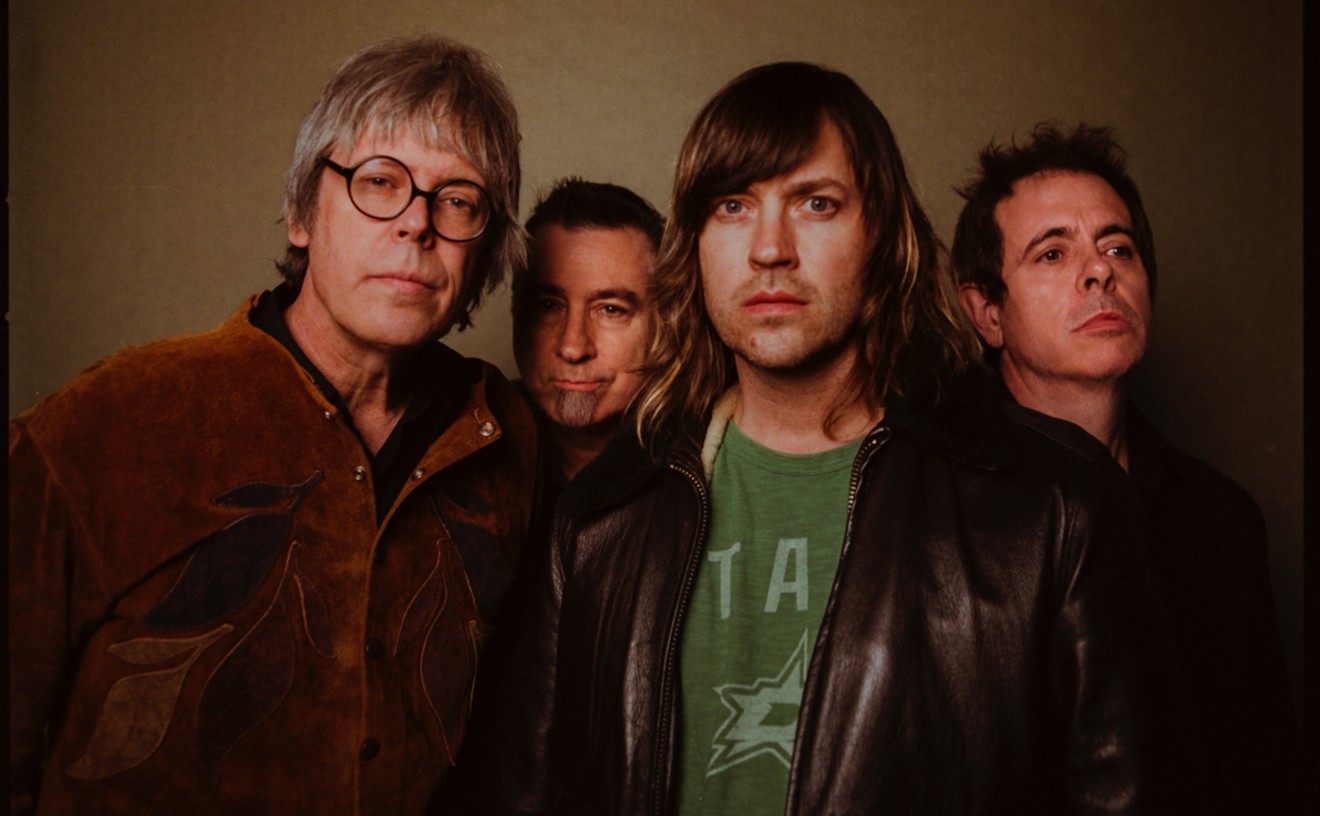"In Dallas right now there are two main groups of people who go to shows," Salim says. "You have the SMU fraternity type of crowd who find us too radical, and you have the grunge, dick-piercing group who think we are 'fag rock' or something. We don't belong to either group. We're somewhere in the middle. We're the antithesis of the clique thing. But there are many people in Dallas who don't belong to those two groups, either, and this is our audience."
When they sit back and reflect upon what has happened during the past six years, Salim and Faris Nourallah sigh and say they have spent most of that time fighting odds always stacked against them. They begin their tale recalling their days in Denton in 1989, when the two began the Moon Festival, a very unfunky band in a town where most anything without a P-Funk groove was considered unhip or worthless.
A couple of years later, the brothers continue explaining, they moved to Dallas, where they say they were promptly swept to the sidelines by a newly sprung grunge contingent. Their perfectionist pop melodies and obsession with the Beatles got them labeled too wimpy, too out of place; at some point, they were even tagged as a Gothic band, among many other things--some very good, some very bad.
But despite being unable to fit in, the Moon Festival landed a record deal with local indie Dragon Street Records, which, to that point, had been releasing moderately successful--but hardly financially rewarding--albums by the likes of Stranglmartin, the Shagnastys, and the Spin. The Moon Festival's debut, Shine, was released in December 1991, and it was a moody affair, packed with well-crafted hooks, intricate textures, and lyrics by Salim that shouted their poetic ambitions. By that time, they had built up a decent but by no means overwhelming local following, but critics were not quick to praise them, reviews being polite at best.
With comparisons to The Church abounding, the national music press was a little more generous with its applause. Reviews in the CMJ New Music Report and The Gavin Report were flattering, and the band took that as an indication to try their luck on the road, playing 128 shows in 1992--performing at the annual CMJ conference in Manhattan, touring the East Coast, driving from Texas to Colorado to California, trying to build a regional and then national audience that would launch them to stardom.
"It was exhausting," Salim recalls of the experience, but it was also necessary.
But by the end of the year, just as it seemed the fruits of their labors might soon pay off, the extensive touring began to take its toll on the band. And to make matters worse, the band and Dragon Street were soon to part ways. Drummer Brad Robertson, now in 39 Powers with Spyche, decided he had enough and turned in his walking papers.
"At the time, we were told that we're going to do another album for Dragon Street," Salim says. "But apparently, the label had run out of money, and it wasn't going to happen. Brad got burned out from the touring and became very disillusioned when he found out that there wasn't going to be another album."
David Dennard, the president and owner of Dragon Street Records, says Moon Festival was simply dropped from the label, and not over a lack of funds; after all, not long after the Festival was off Dragon Street, Dennard had cash enough to release Tripping Daisy's Bill, the Nixon's debut EP, and Hagfish's Buick Men. Rather, Dennard says, he and Patrick Keel simply were not happy with the material the band was writing and recording for their second album. Dennard, who stresses he still likes the band personally and musically, simply didn't hear a hit among the material the Festival was recording, and told the band Dragon Street couldn't afford to release yet another album that failed to get played on the radio and move copies out of record stores.
"Nothing was rockin'," Dennard says of the material the band submitted for the second record. "We called it 'The Gloom Festival,' this moody stuff. As artistically interesting as it was, we weren't going to do it. The next record we did was Tripping Daisy's, and we needed a home run. We put a whole lot of money into the Moon Festival, and they wouldn't compromise artistically to make that jump between what they wanted to write and what they needed to write to get on the radio. We agreed to disagree about their direction, and after trying a bunch of demos we said, 'Let's part ways.'"
So, in the beginning of 1993, the band found itself with no drummer and no label. The Nourallah brothers used the opportunity to rethink the direction of the band and restructure their sound. By the spring of 1993, they found Bob Franzke (formerly of Shock Opera) to take the drum stool, and they moved to Austin, where an old friend named Adam Green was working as a studio engineer and would often allow them into the studio to record for free. (Green is currently finishing the new Red Hot Chili Peppers album.)
"We went in the studio with new ideas and recorded some totally new songs," Faris says. "We experimented with Spanish elements, acoustic guitars, different percussion. By that time, we were listening to a lot of different things, too. It's funny but if you hear our songs, you can hardly imagine that The Jam and The Damned are two of our favorite bands."
They recorded a demo during the summer of 1993 and started shopping labels. But a friend of the Nourallahs' steered them toward Tony Rancich, who had made a fortune in the pecan business in West Texas and built a recording studio on his grove, which was in the middle of the desert outside of El Paso.
"He went overboard--he bought the most expensive mixing board, the most expensive everything," Salim says. "It is like a dream studio. He invited us to stay there and record for as long as we wanted. It was a hacienda with a studio in it." From September of 1993 through the following January, the band recorded every day.
For a band that loves to explore the recording possibilities, Rancich's 16-year-old Village Productions studio in Tornillo was a godsend. It was a rock and roll fantasy coming true--use of a swimming pool and mountain bikes, and unlimited studio time using all gadgets of ultramodern recording technology at their disposal, including a professional sound engineer, Mike Major.
"We had the ability to experiment with different sounds and multiple track layering," Salim says. "For example, we always wanted to do a spaghetti western type of song because we love spaghetti westerns and the music of Ennio Morricone. We did [the song] 'Land of Dust and Sin' without using any samples. We had Tony cocking and shooting his rifle, and we recorded that. He thought it was really cool, so he was out there in the desert with a rifle and headphones on, shooting and having a blast."
But as with any fantasy, the Moon Festival's ended as quickly as it started. By the end of 1993 the pecan business went south, as Rancich told the band and Mike Major, and he began to draw tight the purse strings he had once opened so easily. Salim and Faris say where Rancich had once given them free access to the studio, he began accusing them of wasting time and money. Major recalls Rancich was "definitely stressed" and created an environment in which it was "hard to work"; Rancich then gave the band a week to finish recording and told them to leave.
"It was a pretty strange situation," Major recalls.
Rancich says the whole recording process was never meant to go on "indefinitely," and that it was "mutually agreed upon" the band would mix the album at a different place because other bands were slated to use the studio at the same time.
"He never signed a contract with us, he had all our reels in his possession, and we had no finished product," Faris says. "Luckily, we managed to sneak a DAT tape out with some mixes done by Adam." After wrangling over contracts and questions of ownership of the master tapes, Rancich finally gave the brothers the tapes, with the understanding that if the band ever made money, they'd pay him back, Salim and Rancich explain.
Almost three years after their Dragon Street debut, in September of 1994, the Moon Festival finally released a follow-up, the four-song Pedestal Fall EP that consisted of material recorded in West Texas. On the strength of the EP and the rest of their material, they signed with the tiny indie Tortilla Records to release a proper album. More importantly, the band would have full artistic control over its release. They finished mixing the album--titled Tornillo, "because of all the things we went through in that town," Salim says--earlier this year with producer Keith Rust at Crystal Clear Sound, and are finally getting it into stores.
"This, for us, is the start," Faris says. "Now, we know a lot about the music business. We dealt with labels and contracts and long tours, so we're much wiser. When we were a young band, we used to think that we needed a 'savior,' a label to sign us and release a 'real' record. Now we know that getting signed doesn't mean much."
Tornillo was, in fact, quite worth the wait: it's an impressive album loaded with subtle harmonies, psychedelic tinges and intricate layers of instruments, held together by strong melodies and hooks. "Is It Too Late" stands out as it rides on a bed of soft galloping drums, bongos, and castanets; and a chorus of Spanish trumpets adds an otherworldly dimension to it, transferring you south of the border and north of this world. In "Pedestal Fall" and "Flawed by Magnificence," they use tremolo guitars to create a psychedelic ambience.
The album is steeped in melancholy and the sun and dust of West Texas. It is as if the Kinks spent a few months near the Mexican border, bathed in its peculiar ambience, and let it permeate the songs. It is moody and whimsical, requiring more than a few listens to soak in its complexity and hidden charms; beneath its fragile surface lies a compelling piece of pop music. And its themes of innocence lost, nostalgia, and longing for ideals that have disappeared are consistent to the point where Tornillo also could be called a blues album.
"The prettiest color is blue, don't you know?" Faris says, smiling.
But the bright music contrasts with the dark lyrics penned by Salim, who clearly hails from the Ray Davies-Elvis Costello school of bitter irony and occasional self-sarcasm. "Welcome Home," a song about returning to their birthplace of El Paso, is less a celebratory homecoming than the words of a man who has come back defeated: "'Welcome Home' spelled with icing on the chocolate failure pies," Salim sings, the image strong and sour. Similarly, songs like "Acid Tongue," "Flawed by Magnificence," and "The Man from the Filling Station" make their points with the sharpest wit and most caustic of lines.
"The best lyrics and melodies take you places," Salim says. "A good song creates its own trip. Each person will have their own vision of what those people are or where those places are. You don't need drugs; all you need is an imagination. Good melody doesn't demand anything from anyone. It exists on its own.










